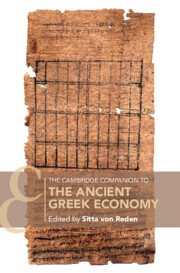Book contents
- The Cambridge Companion to the Ancient Greek Economy
- The Cambridge Companion to the Ancient Greek Economy
- Copyright page
- Contents
- Maps
- Notes on the Contributors
- Abbreviations
- Maps
- 1 Introduction
- Part I Diachronic Perspectives
- Part II Regional Perspectives
- Part III Structures and Processes
- 11 Population
- 12 Consumption, Nutrition, and the Grain Supply
- 13 The Agricultural Economy
- 14 The Non-Agricultural Economy: Artisans, Traders, Women, and Slaves
- 15 Markets
- 16 Money, Credit, and Banking
- 17 Dispute Resolution
- 18 Taxation and Tribute
- Part IV Networks
- Part V Performance
- References
- Index
- Cambridge Companions to the Ancient World
15 - Markets
from Part III - Structures and Processes
Published online by Cambridge University Press: 21 July 2022
- The Cambridge Companion to the Ancient Greek Economy
- The Cambridge Companion to the Ancient Greek Economy
- Copyright page
- Contents
- Maps
- Notes on the Contributors
- Abbreviations
- Maps
- 1 Introduction
- Part I Diachronic Perspectives
- Part II Regional Perspectives
- Part III Structures and Processes
- 11 Population
- 12 Consumption, Nutrition, and the Grain Supply
- 13 The Agricultural Economy
- 14 The Non-Agricultural Economy: Artisans, Traders, Women, and Slaves
- 15 Markets
- 16 Money, Credit, and Banking
- 17 Dispute Resolution
- 18 Taxation and Tribute
- Part IV Networks
- Part V Performance
- References
- Index
- Cambridge Companions to the Ancient World
Summary
The market in ancient Greece should be understood as a specific institutional construct, that of the city-state, which allowed its citizens to exercise private property rights guaranteed by law. By extension, free foreigners were also acknowledged these rights, which however extended to the private ownership of human beings (slavery). The city-state also created the conditions for an unusually high division of labour. Each city was a market space of its own, with its own rules and logic, which could include the control over sales margins and even sometimes the establishment of maximum prices for some perishable fresh goods. The network of hundreds of Greek city-states also created the conditions for the development of an original form of international market.
Keywords
- Type
- Chapter
- Information
- The Cambridge Companion to the Ancient Greek Economy , pp. 221 - 236Publisher: Cambridge University PressPrint publication year: 2022

